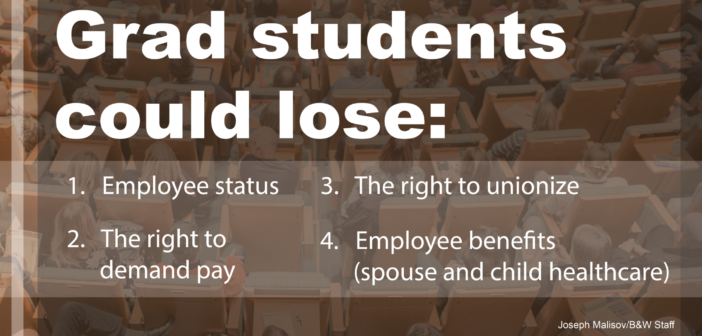The National Labor Relations Board released a proposal for a rule change regarding the status of graduate student workers at private colleges on Sept. 23. If passed, this would reverse the 2016 Columbia case and remove graduate students’ rights to pay, hold employee benefits and unionize.
This new proposal would rule “that students who perform any services for compensation, including, but not limited to, teaching or research, at a private college or university in connection with their studies are not ‘employees’ within the meaning of Section 2(3) of the (National Labor Relations) Act.”
Graduate students could lose eligibility for spouse and child health care, as well as health insurance.
Eugene Rohrer, ’17, president of the Graduate Student Senate and a third-year doctorate student, said this is a concerning infringement on students’ rights.
“It removes a very powerful tool that graduate students can use to leverage in their favor to get adequate working conditions,” Rohrer said.
Rohrer said he believes this decision can be traced to the current National Labor Relations Board members and the federal administration under President Trump.
He said the government is more conservative and less labor-friendly, which he thinks accounts for the new proposal.
Zachary Arms, ’16, external affairs officer of the Graduate Student Senate and a fourth-year doctorate student, was not surprised to learn about the proposal.
“I am not in favor of this proposal, although I’m not surprised it’s happening,” Arms said. “It’s been well known that the (current National Labor Relations Board) is not in favor of graduate students being viewed as workers since the Columbia decision, for a long while. I think that it’s a step backwards, and it takes away a tool that graduate workers could use to have a bigger voice on campus.”
The Trump Administration appoints the members of the National Labor Relations Board.
Arms said the board does not support labor unions such as the United Auto Workers and the Service Employees Union.
Both Rohrer and Arms said affected graduate students should show their discontent by commenting on the proposal change. The new National Labor Relations Board proposal is open for commenting for 60 days before it produces the final changes.
Rohrer and Arms said they suggest utilizing a combination of data and emotional appeal when commenting because the National Labor Relations Board removes redundant and thoughtless comments.
“How effective [commenting]is, it’s hard to say,” Rohrer said. “It’s unclear as to whether or not the (National Labor Relations Board) made this decision, and they’re just pushing it through… or if it’s actually something they’re still heavily considering.”
Rohrer said there are a number of doctoral students studying at Lehigh for five to eight years who depend on these benefits. Voicing their concerns for their eligibility for health care can have some sway in the National Labor Relations Board’s final decision, Rohrer said.
At other institutions, such as Brown University, administrations support their graduate students’ rights by putting commenting on the students’ behalf, Rohrer said.
Patricia Johnson, vice president for finance and administration at Lehigh, said in an email she spoke with Frank Roth, Lehigh’s general counsel.
“At this time, Lehigh has no position on it,” Johnson said in the email. “Frank says that the interpretation has changed back and forth over several years. Universities with a medical school are typically more concerned by the interpretation because of the long hours that interns work.”
The university’s administration has not addressed or commented on the federal policy change, and the only information graduate students were given was through an email from the Graduate Student Senate.
“It would be nice to see the university say, ‘Hey, we support you. If you would like to have the right to unionize whether or not you intend to use it, we’ll be there also putting comments for you, on your behalf,’” Rohrer said.
Hayden O’Rourke, ’20G, a Lehigh Community Fellow, said he is confused about his rights under the current policy change.
O’Rourke said he wondered who would have ownership over new discoveries in research or new articles published as a graduate student. He said now, under the proposal, Lehigh could possibly have more ownership.
Besides commenting on the policy, O’Rourke said he recommends that graduate students do their homework and research what their rights are under current law.
“Be well-versed in policy, right now,” O’Rouke said. “Keep an eye on it.”






Comment policy
Comments posted to The Brown and White website are reviewed by a moderator before being approved. Incendiary speech or harassing language, including comments targeted at individuals, may be deemed unacceptable and not published. Spam and other soliciting will also be declined.
The Brown and White also reserves the right to not publish entirely anonymous comments.
2 Comments
And what do our hedge fund / vulture trustees have to say about it? You know, the ones who refused to rescind Trump’s honorary degree, and are always pleased when unions go away?
Anyone, you know, bother to get in touch and ask? Pick up the phone, maybe?
What is equitable is always in dispute between those who pay and those who receive. The solution is to find a disinterested arbiter who neither promotes slave labor/poverty nor killing the goose of the golden egg. Bethlehem Steel once was a local company. I would think there exists some competition for grad students that should help their bargaining power against the institutional power of the University.
This decision may be followed by others concerning payment for collegiate athletes (ath). Possibly the millions earned by ath could be used to compensate fellow students.